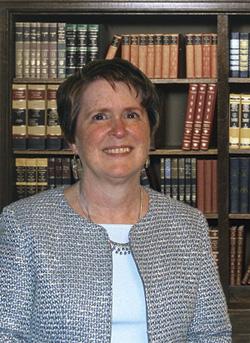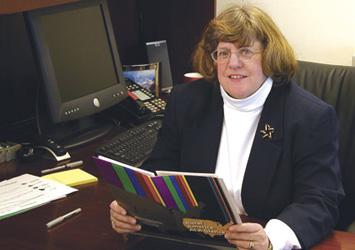Profiles
- Contact: Website Administrator
- 4/1/2005
Kathy Augustine

As Acting Chief of the Information Technology (IT) Services Branch in ERS’s Information Services Division, Kathy Augustine wears many hats, serving as the manager of the agency’s IT infrastructure, as well as performing network administration tasks and responding to Help Desk requests from ERS employees. Her focus on technology improvements has allowed the agency to upgrade its network operating system to the most secure and responsive version of Windows with minimal disruption to ERS staff.
Like most of us, Kathy also wears several hats outside ERS, but one is particularly notable: Kathy is a registered volunteer with the Foster Family program of the Arlington Diocese of Catholic Charities. For over 20 years, she has provided a safe haven for women in crisis pregnancies—about 2 dozen in all—giving them much-needed stability while they work out long-term solutions for independent living with assistance from Catholic Charities.
For the past decade or so, Kathy has brought her community spirit to ERS, serving as a coordinator for the annual Combined Federal Campaign (CFC), the Federal Government’s charitable giving program. Each year, Kathy brings a new level of energy to the job, helping to ensure that ERS’s contributions always exceed the governmentwide average.
For her dedication to community service both within and outside the workplace, the Combined Federal Campaign of the National Capital Area (CFCNCA) recently named Kathy the 2004 CFCNCA Heroine of the Year. Kathy was nominated for this award along with many other highly deserving CFC volunteers from all Federal agencies in the Washington, DC, metropolitan area and was selected as the winner out of 25 finalists. Reflecting her generous spirit, Kathy says “I’m just one of many ERS employees dedicated to community service.”
Leslie A. Whitener

Seven decades of experience with commodity-based farm programs tells us that they have effects far beyond the farm, with implications for rural businesses, residents, and communities. The link between agricultural policy and rural economies is Leslie Whitener’s latest pursuit in a career devoted to the study of rural economic and policy issues. In an upcoming conference sponsored jointly by ERS and the National Center for Food and Agricultural Policy, Leslie is assembling researchers and policy analysts to stimulate new thinking about the changing role of farm and rural policy. Leslie notes that “a clear understanding of policy objectives and intended beneficiaries must be the starting point for discussions of future policy well in advance of the next farm bill.”
During her 20-plus-year stint at ERS, Leslie has examined many aspects of rural American life, ranging from welfare reform to rural housing poverty to farm economic issues. In A Safety Net for Farm Households, she and her co-authors considered alternative scenarios for government assistance to agriculture, based on the concept of ensuring some minimum standard of living. They found that only one safety net scenario would generate lower costs than current programs, but the distribution of benefits would change dramatically. Lower income farmers would benefit relatively more from the safety net scenarios, while farmers producing selected commodities would benefit more from the current programs.
Leslie explored the effects of existing safety net programs on rural residents as editor of a 2002 book, Rural Dimensions of Welfare Reform, the first comprehensive assessment of the effects of welfare reform in rural areas. While the 1996 welfare reform legislation succeeded in reducing welfare dependency and increasing employment and earnings at the national level, results in rural areas were mixed. One of the policy lessons learned from the research is that the poorest, most rural areas are often the hardest to serve.
Leslie joined ERS right out of college and continued to pursue her education, completing a Ph.D. in sociology at The American University in Washington, DC. During her career, she received several awards, including two Secretary’s Honor Awards for Excellence in 2002. For the past 8 years, Leslie has served as Chief of the Rural Economy Branch in the Food and Rural Economics Division. With a multidisciplinary approach, this 24-person staff of economists, sociologists, geographers, and statisticians conducts a broad array of research and policy analyses on rural America. Under Leslie’s initiative, the Branch created the At A Glance series of short, brochure-like publications, each covering a specific topic about rural America. These reports analyze the ongoing changes in rural areas to help policymakers assess strategies to enhance economic opportunity and quality of life for rural Americans.

